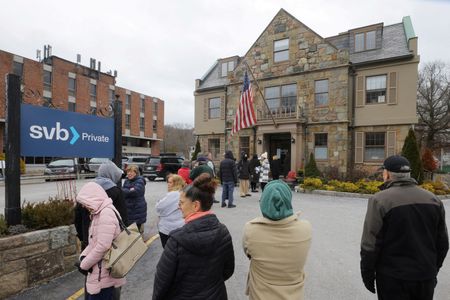 1
1 1
1

(Reuters) – Bruised U.S. bank stocks regained some ground on Tuesday, as a sell-off sparked by Silicon Valley Bank’s collapse gave way to bargain-hunting by investors hopeful that efforts to shore up confidence would avert a wider financial crisis.
DEVELOPMENTS
* Ratings agency Moody’s cut its outlook on the U.S. banking system to negative from stable “to reflect the rapid deterioration in the operating environment.”
* The Republican chairman of the House Financial Services Committee urged confidence in the U.S. banking system and said the Federal Reserve and regulator FDIC had “acted swiftly and boldly” within the law. Without giving specifics, he also said he wanted to hear from both the banks and regulators.
* Regulatory scrutiny of SVB’s demise intensified with the U.S. Justice Department opening a probe, a source familiar with the matter said. The Securities and Exchange Commission has launched a parallel investigation, according to the Wall Street Journal.
The SEC and a spokesperson for the Justice Department in Washington declined to comment. SVB did not immediately respond to a request for comment.
* Apollo Global Management Inc, Blackstone Inc and KKR & Co Inc have expressed interest in a book of loans held by SVB, Bloomberg News reported, citing people familiar with the matter.
* Democratic U.S. Senator Elizabeth Warren called on Federal Reserve Chair Jerome Powell to recuse himself from an internal review of recent bank failures, saying his actions “directly contributed” to them.
*Senate Banking Committee Chairman Sherrod Brown urged Congress to enact regulations to strengthen stress tests and capital and liquidity standards for banks, and said he hoped the Fed would not raise rates when it meets next.
* Chancellor Olaf Scholz said Germans should not have major concerns and that regulators had learned lessons from the global financial crisis in 2008.
MARKETS
* The S&P 500 regional banks index rebounded 1.4%, leaving it with a 26% loss over the past five sessions. First Republic Bank surged 27%, while KeyCorp jumped over 7%.
Among large U.S. banks – to which sources say customers have moved deposits to over the past week – Citigroup regained almost 6% and Wells Fargo added 4.6%.
* Global shares turned higher, ending a five-session rout, as U.S. inflation data bolstered bets on a smaller interest rate hike by the Federal Reserve next week.
* U.S. Treasury yields rose on Tuesday, a day after major declines, as investors consolidated positions and weighed the monetary policy impact of banking system turmoil against stubbornly high inflation.
* Europe’s banking index ended up 2.7% after posting its biggest percentage loss in over a year on Monday.
* Euro zone government bond yields rose as investors reckoned repricing of the European Central Bank’s tightening path in recent days might have been overdone.
* Traders currently see a 77% chance of a 25 basis-point increase at the meeting, while expectations for no rate hike have fallen to 23%. Early last week, a 25 basis-point hike was fully priced in, with a 70% chance seen of 50 basis points.
* The ECB’s deposit rate is seen peaking at around 3.65%.
QUOTES
* “This is part of the process of the knob being turned to tighten financial conditions to make sure that we are on our way to normalising a higher interest rate world,” Morgan Stanley co-president Edward Pick said on Tuesday. “But there might well be surprises, there might well be reactions.”
*”The market is having an opportunity to digest some of the news over the last couple of days,” said Matthew Keator, managing partner, the Keator Group. “(Investors) are seeing a coordinated effort with various government agencies, and with hindsight, they’re feeling as if things have contained themselves a bit.”
(Compiled by Catherine Evans, Nick Zieminski and Anna Driver; Editing by Matthew Lewis)